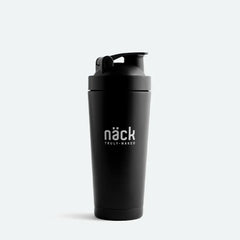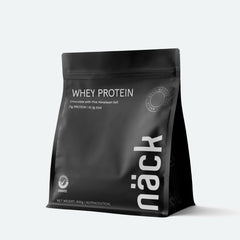EAA+Electrolytes
EAA+Electrolytes
EAAs refers to the 9 essential amino acids that our body cannot synthesise and must obtain through diet. They are the building blocks of muscle protein in our bodies. The 9 EAAs are leucine, isoleucine, valine, lysine, methionine, phenylalanine, threonine, tryptophan, and histidine. Out of these, 3 are BCAAs or branched-chain amino acids - leucine, isoleucine and valine. BCAAs are especially known to effectively stimulate the process of muscle protein synthesis (MPS) in the body.
Evidence suggests that leucine is the main catalyst for MPS, and is a key driver for muscle growth in our bodies. Research shows that our body synthesises muscle protein most effectively when leucine intake is more than 3g per serving. While BCAAs, especially Leucine, plays an important role in initiating this process, it is still necessary to consume all essential amino acids in adequate amounts for optimal protein synthesis, muscle recovery and overall health.
Protein that we consume through food has EAAs but they’re also available in so-called free form i.e. they do not need to be digested by the body in the same way as proteins, rather they can be absorbed directly into the bloodstream. They enter the bloodstream rapidly, and from there, the amino acids are absorbed by the body to start the process of muscle protein synthesis.
Consumption of EAAs helps boost exercise performance, support muscle recovery, reduce muscle soreness, mitigate muscle breakdown, increase endurance and a lot more!
Electrolytes such as magnesium, sodium and potassium are essential micronutrients and minerals that we need to get from our diet. The body needs electrolytes to maintain normal homeostasis - the body’s self regulating process to maintain and balance steady internal, physical and chemical conditions within itself. Intake of electrolytes regulates fluid balance, muscle contractions, and pH levels, amongst other things. This in turn helps the body battle fatigue, increase endurance and boost hydration during and beyond the workouts.
Increased exercise performance :
An optimised dosage of essential amino acids helps enhance exercise performance. Free-form EAAs enter the bloodstream rapidly and are used up by active muscle tissue for sustainable energy.
Twenty adult males were enrolled in a double-blind crossover placebo-controlled study. Subjects were randomised to receive EAA mix or a placebo in two successive trials 7 days apart. In both trials, subjects completed a REP 2 h after the ingestion of the EAA mix or PLA. Before ingestion and after REP subjects performed isometric contractions of the dominant upper limb with the elbow joint at 120 degrees.
Faster muscle recovery:
During intense physical activity, the body breaks down muscle tissue for energy. EAAs, which are the building blocks of muscles in our bodies, help preserve muscle mass by providing our bodies what it needs to synthesise muscle protein.
Leucine is a key branched-chain amino acid that plays a significant role in stimulating the synthesis of muscle protein. Research suggests that a minimum of 3g leucine is required to maximise the muscle protein synthesis in the body.
In a randomised, double-blind, placebo-controlled, parallel-group design, twenty recreationally active males consuming a controlled diet were supplemented thrice daily with LEAAs (leucine-enriched amino acids) or isocaloric placebo for four days following an acute bout of lower-body resistance exercise. The data suggests that LEAAs moderately attenuated muscle damage in the days following an acute bout of resistance exercise in free-living recreationally active men.
A double-blind, randomised crossover trial was conducted over a 5-week period. Ten untrained males were asked to repeatedly flex and extend their elbows for 10 counts/set × 5 sets at full power while using a dynamometer. The participants took 3.6-g supplements (LEAA mixture or placebo) 3 times daily for 7 days. LEAA consumption suppressed exercise-induced elevation of muscle damage markers in blood, which suggests that LEAA could attenuate muscle damage and aid muscle recovery.
-
Leucine-Enriched Essential Amino Acids Improve Recovery from Post-Exercise Muscle Damage Independent of Increases in Integrated Myofibrillar Protein Synthesis in Young Men. doi: 10.3390/nu12041061.
Marcus Waskiw-Ford et al.
-
Effect of a leucine-enriched essential amino acids mixture on muscle recovery. https://doi.org/10.1589/jpts.31.95.
Yasushi Matsui, Shoji Takayanagi et al.
Reduced muscle soreness:
EAAs provide the necessary building blocks for muscle repair. An optimised ratio of BCAAs such as 4:1:1 with a minimum of 3g leucine is required to ensure your body gets the maximum nutrients it needs to repair damaged muscle tissue and reduce post-workout soreness.
-
1. Effect of branched-Chain Amino Acid Supplementation on Muscle Soreness following Exercise: A Meta-Analysis. DOI: 10.1024/0300-9831/a000543.
Michael V Fedewa, Steven O Spencer et al.
Accelerated muscle protein synthesis and reduced muscle breakdown:
Essential amino acids are vital for stimulating muscle growth and adaptation. They mitigate catabolism - a process in which large protein molecules are broken down into amino acids, and hence help mitigate muscle breakdown.
-
Regulation of muscle protein by amino acids. DOI: 10.1093/jn/131.10.3219S.
Robert R Wolfe
Reduced exercise fatigue:
Hydration during workouts is vital to prolong endurance activity and to help battle exercise fatigue. When we sweat, we lose not only water but also essential electrolytes like sodium, potassium, and magnesium. Replenishing these electrolytes helps maintain proper fluid balance and prevent muscle cramps.
Magnesium malate, known to be of higher bioavailability compared to more commonly used preparations such as magnesium oxide or magnesium citrate is a great source of magnesium.
Twenty men and women participated in this crossover study. For each trial, subjects were dehydrated, provided one of three random beverages, and monitored for the following three hours. Measurements were collected prior to and immediately after dehydration and 4 hours after dehydration. Results showed that an electrolyte supplement may enhance cellular rehydration rate in healthy men and women after acute dehydration of around 2% body mass loss.
-
An amino acid-electrolyte beverage may increase cellular rehydration relative to carbohydrate-electrolyte and flavoured water beverages. 10.1186/1475-2891-13-47.
Chih-Yin Tai, Jordan M Joy et al.
Increased endurance:
Electrolytes help build endurance during training, and are perfect for people who exercise for long periods of time.









